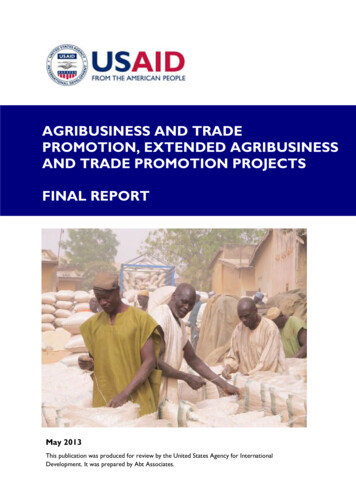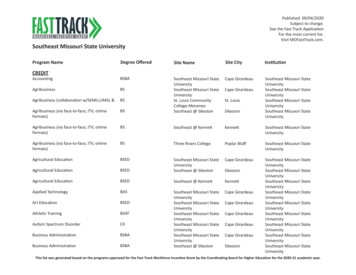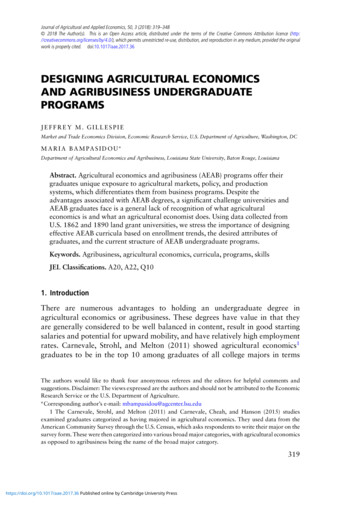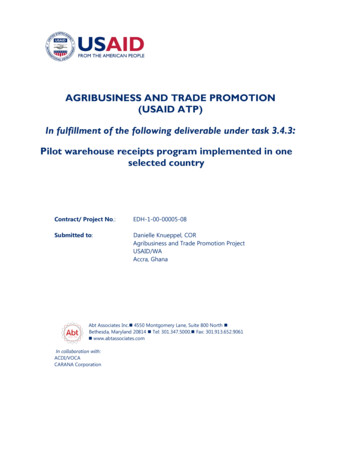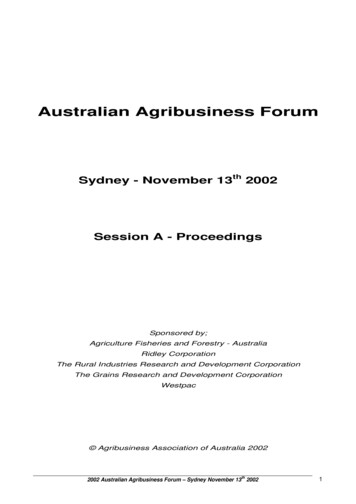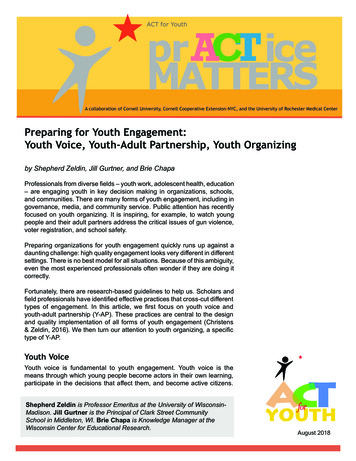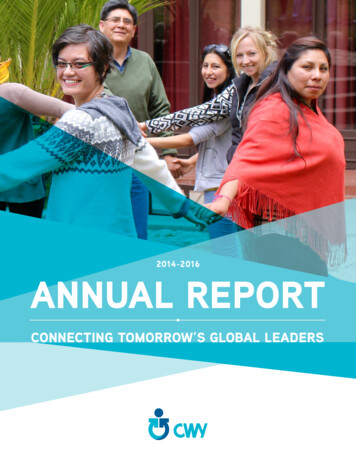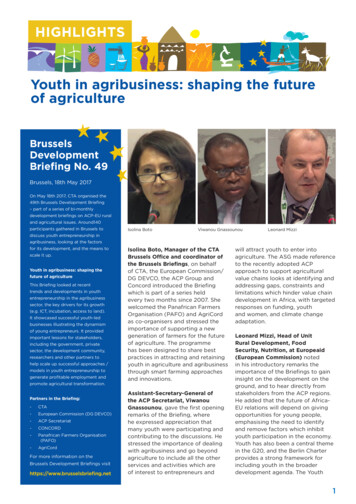
Transcription
Youth in agribusiness: shaping the futureof agricultureBrusselsDevelopmentBriefing No. 49Brussels, 18th May 2017On May 18th 2017, CTA organised the49th Brussels Development Briefing– part of a series of bi-monthlydevelopment briefings on ACP-EU ruraland agricultural issues. Around140participants gathered in Brussels toIsolina BotoViwanou GnassounouLeonard Mizzidiscuss youth entrepreneurship inagribusiness, looking at the factorsfor its development, and the means toscale it up.Youth in agribusiness: shaping thefuture of agricultureThis Briefing looked at recenttrends and developments in youthentrepreneurship in the agribusinesssector, the key drivers for its growth(e.g. ICT, incubation, access to land).It showcased successful youth-ledbusinesses illustrating the dynamismof young entrepreneurs. It providedimportant lessons for stakeholders,including the government, privatesector, the development community,researchers and other partners tohelp scale up successful approaches /models in youth entrepreneurship togenerate profitable employment andpromote agricultural transformation.Partners in the Briefing:-CTA-European Commission (DG DEVCO)-ACP Secretariat-CONCORD-Panafrican Farmers Organisation(PAFO)-AgriCordFor more information on theBrussels Development Briefings visithttps://www.brusselsbriefing.netIsolina Boto, Manager of the CTABrussels Office and coordinator ofthe Brussels Briefings, on behalfof CTA, the European Commission/DG DEVCO, the ACP Group andConcord introduced the Briefingwhich is part of a series heldevery two months since 2007. Shewelcomed the Panafrican FarmersOrganisation (PAFO) and AgriCordas co-organisers and stressed theimportance of supporting a newgeneration of farmers for the futureof agriculture. The programmehas been designed to share bestpractices in attracting and retainingyouth in agriculture and agribusinessthrough smart farming approachesand innovations.Assistant-Secretary-General ofthe ACP Secretariat, ViwanouGnassounou, gave the first openingremarks of the Briefing, wherehe expressed appreciation thatmany youth were participating andcontributing to the discussions. Hestressed the importance of dealingwith agribusiness and go beyondagriculture to include all the otherservices and activities which areof interest to entrepreneurs andwill attract youth to enter intoagriculture. The ASG made referenceto the recently adopted ACPapproach to support agriculturalvalue chains looks at identifying andaddressing gaps, constraints andlimitations which hinder value chaindevelopment in Africa, with targetedresponses on funding, youthand women, and climate changeadaptation.Leonard Mizzi, Head of UnitRural Development, FoodSecurity, Nutrition, at Europeaid(European Commission) notedin his introductory remarks theimportance of the Briefings to gaininsight on the development on theground, and to hear directly fromstakeholders from the ACP regions.He added that the future of AfricaEU relations will depend on givingopportunities for young people,emphasising the need to identifyand remove factors which inhibityouth participation in the economy.Youth has also been a central themein the G20, and the Berlin Charterprovides a strong framework forincluding youth in the broaderdevelopment agenda. The Youth1
Youth in agribusiness: shaping the future of agriculture HIGHLIGHTSEstelle GallotFatma Ben Rejebconsultation presented positivesignals in support of agribusiness,especially for the creation ofquality jobs, but will requirestrong investments particularly intechnology and research. Failureto tackle high levels of youthunemployment can compromisethe social stability. Mr Mizzi hopedto convey the key points andmessages from the Briefing to theEuropean Development Days, theG20 and the Africa-EU Summit inorder to promote an enabling policyenvironment for youth.Estelle Gallot, Expert at AgriCord,stressed the important role playedby farmer’s organisations in thisarea, and also the partnershipbetween AgriCord, PAFO andCTA. AgriCord contributes tostrengthening the capacity offarmer’s organisations in Africa,which are then better able torespond to the issue of youthemployment. She lamented thatthere were not enough farmer’sorganisations which includedyouth in their activities, and thiswould have to change towardsmore inclusivity. More effortshave to be made to attract youth,and put in place programmesthat support youth participationnotably through greater capacitybuilding; integration of youth intothe agricultural economy; andsupporting farmer led enterprisessuch as co-operatives, which cancreate direct on and off-farmemployment for youth.It is important to also give visibilityto successful cases of youthMichael Hailuentrepreneurs, particularly thoseusing technology and innovationto make agriculture productiveand profitable.Fatma Ben Rejeb, CEO of thePanafrican Farmer’s Organisation(PAFO) stressed the need forcommon approaches in Africa.She highlighted the fact thatagribusiness had received greaterprominence in the debate asan objective and offers greatopportunities of partnershipswith other African institutions.Ms Ben Rejeb also echoed theneed showcase successful youngagribusiness entrepreneurs, whohave mostly grown their businessthrough their own efforts andinitiative, and for them to sharetheir lessons with other youthon what it takes. As such, sheencouraged the documentation ofthese agribusiness entrepreneursand greater knowledge sharing anddissemination. This must be pairedwith greater follow-up to promoteinvestments and partnershipsto benefit youth in agribusiness.She also thanked the EuropeanCommission for its support, andits emphasis on agribusiness andyouth, and noted with appreciationthe collaboration with CTA andAgriCord. The three institutionsrecently signed an agreement tosupport business and finance skillsdevelopment as well as smartfarming, taking advantage of thenew technologies in support toimproved production and marketaccess. A big challenge, according toMs Ben Rejeb, is to address the lackof profitability in the rural economy,particularly agriculture, which iswhere she hopes the ongoing workby PAFO, CTA and AgriCord willhelp enable youth to help each otherto find bankable solutions for theagricultural sector.Michael Hailu, Director of CTAconcluded the opening remarks,noting the importance of thepartnership for CTA with PAFO andAgriCord, and thanking the ACPSecretariat and the EU for theirsupport for the Briefing. He beganby reminding the audience thatyouth employment is an issue acrossthe whole ACP and not just Africa,but also that given their significantfood imports, these regions arealso indirectly exporting jobs whichcould be created in the agriculturalsector to boost productivity. Assuch, solutions need to be foundto transform more agricultureinto agribusiness, to includetechnology, innovation, skills andother approaches which encourageprivate sector investments, in orderto offer job opportunities in Africa.He noted that although therewas growth in Africa, this growthwas not matched by job creation,particularly to absorb the size ofthe Africa youth bulge and numbersof youth entering the job market.Many factors have to be considered– training, capacity building,infrastructure, investment – and therole of development stakeholdersis to promote the right enablingpolicies in place. CTA’s approachhas been to capture and facilitateinnovations and demonstrate to2
Youth in agribusiness: shaping the future of agriculture HIGHLIGHTSBetty WampflerPeter Kuria Githinjiyouth how these can be used tocreate jobs, especially throughInformation and CommunicationTechnologies (ICTs). There is a lot ofinterest in this area already, addedMr Hailu, but stakeholders need tofind wise to maximise and capitaliseon this momentum. For CTA, thismeans documenting the models thatwork and helping to scale them up.Panel 1: Employmentcreation for youth inthe agricultural sectorThe first panel on Employmentcreation for youth in the agriculturalsector was chaired by Michael Hailu,and considered various perspectiveson youth employment from research,policy and practice and define keyactions to be taken to support youthin agribusiness.Betty Wampfler, Deputy Director,IRC / SupAgro shared researchbased on youth employment data,showing that growth in the numberyouth in rural areas entering thelabour market, but without sufficientjobs in the tertiary and secondarysectors, meaning that agricultureis now being looked at as a sectorto provide jobs for youth. Thequestion then becomes what kindof agriculture, which rural sectors,and what policies can help to deliverthese jobs. Given the challenges,a new development paradigm isneeded, with three scenarios. Thefirst is transforming family farmingto carry out essential functions.Secondly, youth enabled agriculturaltransformation by adding greatervalue, with support services toencourage this change. The thirdis to provide greater political willto create support mechanismsand an enabling environment.SupAgro’s work with a broadnetwork of partners has beencarried out in Africa, Cambodiaand France, looking at how youthget involved in job creation, andwhat help they need to make thesesystems sustainable. Some of theoutcomes of this research showthat the landscape for youth-led jobcreation is complicated, as there aremany competing factors includingaccess to land and finance, skillsand social integration. The researchfound that family farming is not astrong motivation for youth, youthare often under resourced, andmany families don’t support youthto stay in agriculture. Researchon training support mechanismsshowed that these were popularwith youth, but there are challengesof implementing the skills intothe context of family farming,although positive results werenoted especially as their agriculturalactivities become professionalised.Peter Kuria Githinji, Directorof Business Development andPartnerships at the AfricanAgribusiness Incubators Network(AAIN) in Ghana began by notingthe challenges which affect youthin agribusiness, and followed byexplaining how incubation canhelp to promote innovation andentrepreneurship among youth,and ensure the future of agriculture.He emphasised the importanceof understanding the economic,political and social context inwhich agriculture operates in orderto ensure that solutions actuallyrespond to needs on the groundand respond to consumer habits.Incubation tries to bring togetherthis knowledge and expertise erto provide support for incubatees,particularly in respect to the valuechain in which they are operatingand the areas where they canengage. Especially critical is the“architecture” of the value chain,as many people enter into thesector without grasping how thevalue chain really works, in termsof demand, post-harvest losses andother gaps. AAIN is now working in20 countries though it covers all 54African states, and has partnershipswith many institutions includingCTA, the AfDB, FAO, governmentsand youth organisations and worksas an incubator of incubators. PeterKuria explained that incubationlooks at both the architecture andthe ecosystem of agribusiness,ensuring that the right environmentis in place for young businesses togrow. He gave the example of the“learn as you earn” model, whichinvolves encouraging incubatorsto be established in, or linked withlearning institutions so that younggraduate entrepreneurs are able toenter into an environment suitableto help them develop a businesssuccessfully and create jobs.Incubation should provide accessfor the needs of the entrepreneur– from finance and technology tocontact with the private sector3
Youth in agribusiness: shaping the future of agriculture HIGHLIGHTSGerald Otimand mentorship. This model andincubation more broadly, holdsa lot of potential for the Africanagribusiness sector, but it needsto be scaled up.Gerald Otim, the founder and Chiefoperating officer of Ensibuukoin Uganda, provided a youthperspective on how ICTs can be usedto improve the financial inclusionof youth. Mr Otim’s backgroundis one of agriculture, having beenraised on a farm by a single mother,using the proceeds made from hisfarm work to pay for university.Uganda’s population is among theyoungest in the world – with 77%being between ages 15-25, and theyouth unemployment standing at80%. With better access to financialservices and affordable credit, youthcould transform agriculture, but theyface challenges such as distancefrom banks which are located inurban areas, and unfavourablelending terms. As an entrepreneur,he took particular interest in theapproach of SACCOS (co-operativefinancial institutions) for youth,which are owned, managed andoperated for the benefit of the localcommunity. They are very activein Uganda with approximately halfthe population being active in aSACCO. Ensibuuko started workingwith SACCOs after winning the firstCTA AgriHack competition in 2013,successfully helping them to reachnew customers, especially youth,using ICTs. Its services help theSACCOs to address inefficienciesand challenges, linked to reliance onpaper-based bookkeeping, inabilityto manage data and information,manual process systems and lackof security, which makes it a highrisk model that’s difficult to scale.Ensibuuko designed a microfinancesoftware MOBIS, for SACCOs whichis a cloud-based, allowing serviceto be used and managed from acentral system, rather than beingfragmented. It also provides mobilemoney/banking service throughpartnerships with the biggestnetwork providers in Uganda, andis accessible to low-tech phonesthrough USSD software. This makesbanking for the farmers faster,cheaper and more efficient, andthe access to data allows SACCOsto constantly innovate. Ensibuukoserves 72 institutions in Uganda withover 6000 members, helping themto be more efficient, and is in theprocess of expanding its servicesinto Zambia and Malawi.The questions and answers sessiondiscussed about the possibilityof rapidly replicating successfulapproaches such as mobile bankingand incubation across Africa, andin particular, for incubation facilitiesto be set up in rural areas. Thepanel was asked about suggestionson how to integrate youth intomore decision-making bodies andalso mass learning or informationdissemination approaches, aswell as how to improve access tofinance for youth beyond SACCOsand microfinance. Betty Wampflernoted that SupAgro’s centres arein rural areas, but even so, accessto information for youth remains achallenge and better methods areneeded to integrate centres into ruralsectors, and to make informationmore actionable. Peter Kuria Githinjisuggested that more efforts be madeinvest into scaling up in Africa. Henoted that there should be betterways to integrate both old andnew knowledge systems, and thatincubators can work as a means tohelp youth entrepreneurs to be morebankable through training, supportetc. Gerald Otim explained thattechnology was very scalable andreplicable, but doing so requires alot of financial and human resources.Investment for agribusiness ischallenging because more capital isneeded compared to running a smallscale farm, and so other stakeholdersshould be partnering to enableagribusiness to grow. As to theSACCO model, Mr Otim argued thatbecause it is built entirely aroundtrust, unlike banks whose model is toavoid risk, they are better positionedto help youth who may not otherwisebe “bankable”, and this is furtherenhanced through ICT. Leonard Mizzialso encouraged ACP stakeholdersto promote and ensure discussionstake place at the local levels in theircountries with government, and atregional levels with big developmentactors, but especially for morestreamlining in the engagement toensure results. The EC’s priority is toensure interventions where they canbring added value in agribusiness,and other areas, especially asfunding resources will becomescarcer in the future.4
Youth in agribusiness: shaping the future of agriculture HIGHLIGHTSManess Ngoma NkhataBertrand FoffePanel 2: Successesand opportunitiesahead for youngfarmers andentrepreneursThe second panel, chaired byLeonard Mizzi, explored successesand opportunities ahead for youngfarmers and entrepreneurs.Maness Ngoma Nkhata of LakeshoreAgro-Processing Enterprise (LAPE)in Malawi reminded that Malawi’syouth unemployment stands atalmost 19%, and of those working,47% are employed in subsistenceagriculture. LAPE was founded in2007. It partners with rural farmersunder a business model involvingcontract farming to grow keycommodities such as soybeans,sunflowers, groundnuts and cassava,to which it adds value throughprocessing to create products forhuman and livestock consumption.LAPE deliberately targets womenand youth in farming as businesspartners, providing them withinputs, services, training under GAP,extension services and contractpurchasing, processing and marketaccess. In order to support youthand women entrepreneurship,LAPE has established agribusinessincubation services and makesland available for those who donot have their own, acting as theofftaker. Its success is down tothe fact that it works with existingagriculture production communitiesand also engages a variety ofstakeholders including the Ministriesof Agriculture, Gender and Trade,and social organisations. It alsopushes for publicity among farmersand ensures they receive thefinance and inputs that they need.Partnering with women and youthfarmers is a win-win for LAPE, asthey have high credit repaymentrates, they tend to be more stable,are hardworking, and cooperative interms of adopting new technologies.Some challenges that LAPE facesinclude the cultural context forwomen and youth in Malawi withundervalues them, and there arelimitations for LAPE in terms ofland, capital and technology toreally upscale production, so largeorder cannot be fulfilled. Theyhope to address this buy procuringa flash dryer, scaling up theirincubation centres, and establishinga Cooperative Development Fund.Ultimately, under the Youth AgriEntrepreneurship for Job CreationProgramme, LAPE aims to direct10,000 youth agripreneurs intocommercial farming and valueaddition, and provide 10,000 youthagripreneurs with agribusinessincubation in order to create moregainful employment.Bertrand Foffe the founder ofJangolo Farm (www.jangolo.cm)in Cameroon, an e-commerceplatform, which since 2016 havereceived support from CTA as oneof the finalists of the Pitch AgriHack competition held in Nairobi.Jangolo is a project with youngICT experts at its helm, and itsgoal is to have a positive impacton development in Cameroon bytargeting the agriculture sector,which is the main job generator inthe country. The founders’ aim wasto show the availability and varietyof high quality local products, whichcould be supplied consistently. Thereare therefore two components toJangolo Farm – e-trade and supply.As IT specialists, their approachwas innovative – using existing datafrom research and studies, but alsothrough the collection of their owndata using a second platform, www.farmers.cm. Ensuring a guaranteein sourcing / supply meant makingit digital and efficient whichaccording to Mr Foffe, involvedestablishing communication withfarmers/producers – which wasoriginally done by telephone – butthe developers then created an appwhich would be allow the farmersthemselves to be able to followproduction as early as when theyhave decided what commoditythey will produce. Farmers are ableto check their expenses and knowmarket prices for their produceinstantly, and in turn, Jangolo Farmwill be able to determine whatproduce is available from whichfarmers at what time and whichprice and at what volumes, thusensuring a steady supply. Thisenhances efficiency, because thefarmer can focus on production, andthe developers focus on marketingand distribution, informationgathering and sharing. The successof the platforms is in understandingand working in tune to the farmer’sproduction cycle and demands.There is a growing demand at5
Youth in agribusiness: shaping the future of agriculture HIGHLIGHTSPatrick Sakyithe local and international levelfor Jangolo Farm, especially forCameroonian diaspora, which isalready selling 250 products fromlocal farms. Some of the challengesJangolo Farm faces includeguaranteeing quality and standardsof products, and its next steps is toposition itself to enable farmers toget better access to finance.Ghanaian Patrick Sakyi, an expertmobile commerce businessof Farmerline, gave the lastpresentation. Ghana has impressivemobile phone penetration ofover 120%, and cheaper andwider coverage has enabledtransformation in the country, butit still faces challenges in terms ofhigh illiteracy rates in rural areas,and limited government supportfor farmers through extensionservices. Another issue is the lack oftraceability and transparency in thesupply chain. Farmerline’s mission isto empower farmer entrepreneurs,by providing information andservices and connecting them tomarkets. The company uses itsown app for mass communicationsthat can be sent via sms or voice.They also enable the digitalisationof key production and farmerdata, which is important for otherservice providers such as buyersand lenders. Finally, Farmerline hasa significant network of trainers andagents, enabling them to reach 150communities in one year, to providesupport services and training. Threecritical types of information areprovided via Farmerline – weatherforecasts, market prices and GAPguidance in coordination with theMinistry of Agriculture– with thisinformation being customisableaccording to language, accessibilityand affordability. The type of datacollected is varied, from farmerprofiling to traceability in thesupply chain, mapping, certificationaudit and more. This data is usedby Farmerline clients to generateinstant reports, which primarilybenefits the smallholder farmersas, as well as agribusinesses,development organisations andgovernment. The main challengesfaced by Farmerline are inconsistentnetwork coverage in rural areas,competition for ICT talent, and lackof mentorship. It has grown sinceits foundation in 2013, employing22 staff across two offices in Ghana(Accra and Kumasi), reaching200,000 farmers in nine Africancountries, with the aim of increasingthis to 1 million by 2020. A bigadvantage of ICT is its potential forwide replication without the needfor physical presence of Farmerlinein each of the new countries, and thecompany is looking at opportunitiesin enabling farmer’s access tofinance, value addition, organicproduction and more.Questions and Answers in thesecond panel addressed linkingwith government and farmer’sorganisation, client satisfaction,access to farmers and expandingservices to diaspora. Speakerswere asked about the ownershipof data and also encouraged toexpand opportunities for businessto business exchanges and betweenyouth agribusiness entrepreneursor groups in various continents.The audience also wanted toknow how research networkscould support young agribusinessentrepreneurs, how the outgrowerscheme of LAPE works and accessto finance. Patrick Sakyi explainedthat Farmerline protects farmer’sdata by using memoranda ofunderstanding, which are boundby data protection laws, and alsocalled on the research communityto assist with widescale impactassessment studies. Lastly, he hopedto get assistance for Farmerlineto be introduced to partners inother countries in order to helpit expand in response to theirneeds. Maness Ngoma Nkhatasaid LAPE had good links with thegovernment, working as a teamto provide extension services,and clarified that the farmercontributes around 5% of earningsto use LAPE’ s land. BertrandFoffe explained that Jangolo Farmhas various approaches to assessconsumer satisfaction, e.g. customersatisfaction forms and tastingevents. They began by using socialmedia to reach farmers, and nowpartners mainly with cooperativesto market to their members, andrecently began using the databaseof the agricultural institute. Theirtechnology is very replicable andhighly compatible with variousplatforms. Additionally, he notedthat while data that is inputted intheir system is protected and onlydisclosed if the producers agreesto do so (i.e. when applying for aservice such as finance), Jangolo6
Youth in agribusiness: shaping the future of agriculture HIGHLIGHTSFarm could benefit from researchand capacity building around thelegal aspects of data protection.Further questions were raised onvalue addition, how Farmerline’smodel generates profits. A bigquestion asked was why youtharen’t financed by donors or biglending institutions. Maness Nkhataexplained that she started withno capital, but had some land shefarmed and used it to get creditto buy more land on which shestarted LAPE, but the big issue inMalawi is that institutional or donorfinance mainly goes to governmentprojects and not the private sector.Patrick Sakyi described varioussources of income for Farmerlineprofits – farmer subscriptionrates, leasing of the technologyand other partnerships help themmake revenuer. Bertrand Foffeencouraged youth to go out thereand find likeminded peers to getprojects off the ground and torealise their dreams.Leonard Mizzi concluded theBriefing by echoing the viewsthat it is important to supportyouth to realise their dreams, andherein lies an opportunity for therecommendations from the Briefingto be presented to the G20 toinstigate action supporting youth.Michael Hailu added to the closingremarks by drawing attention tothe massive potential of youth andICT, noting that some of the world’sbiggest companies began with thissame combination. In addition, thepartners of the Briefing – PAFO andAgriCord – were also thanked fortheir support to young farmers andentrepreneurs.Further information available online: Brussels Briefings: www.brusselsbriefings.net esources on Youth in press.com/2017/04/bb-49 ressources youth-in-agribusiness.pdfRecommendations to the 2017/06/ibo g20 youth in agribusiness brief.pdf Report prepared by Lebo Mofolo, Junior ProgrammeAssociate (Policy Briefs) and Isolina Boto, Manager ofCTA Brussels Office.7
Youth has also been a central theme in the G20, and the Berlin Charter provides a strong framework for including youth in the broader development agenda. The Youth Brussels Development Briefing No. 49 Brussels, 18th May 2017 On May 18th 2017, CTA organised the 49th Brussels Development Briefing - part of a series of bi-monthly


